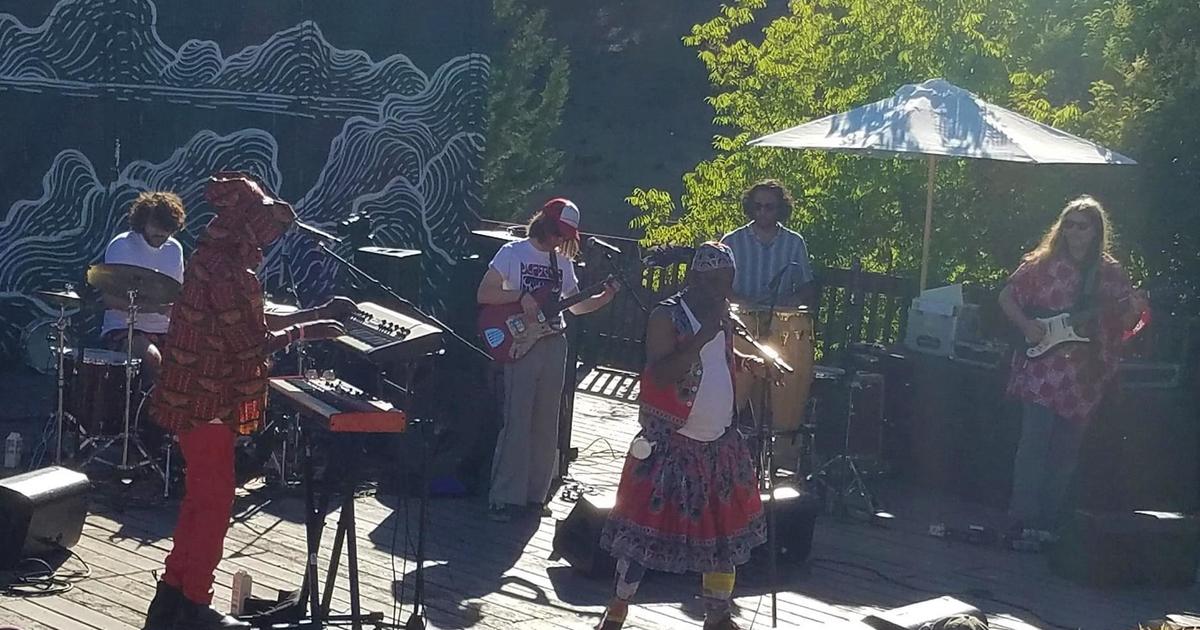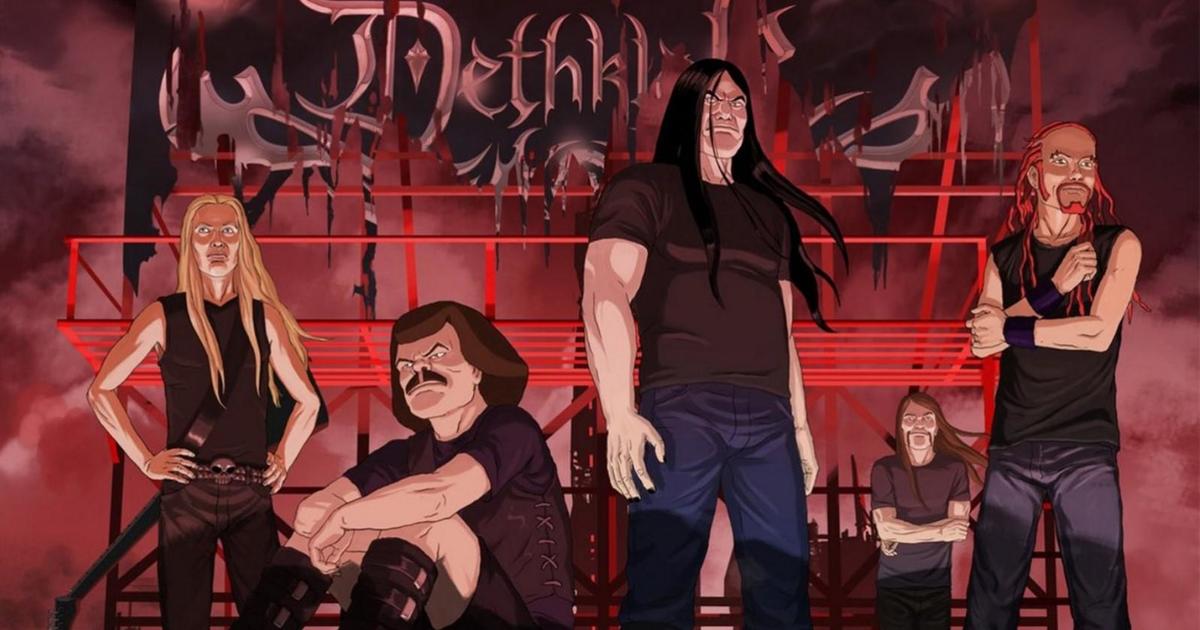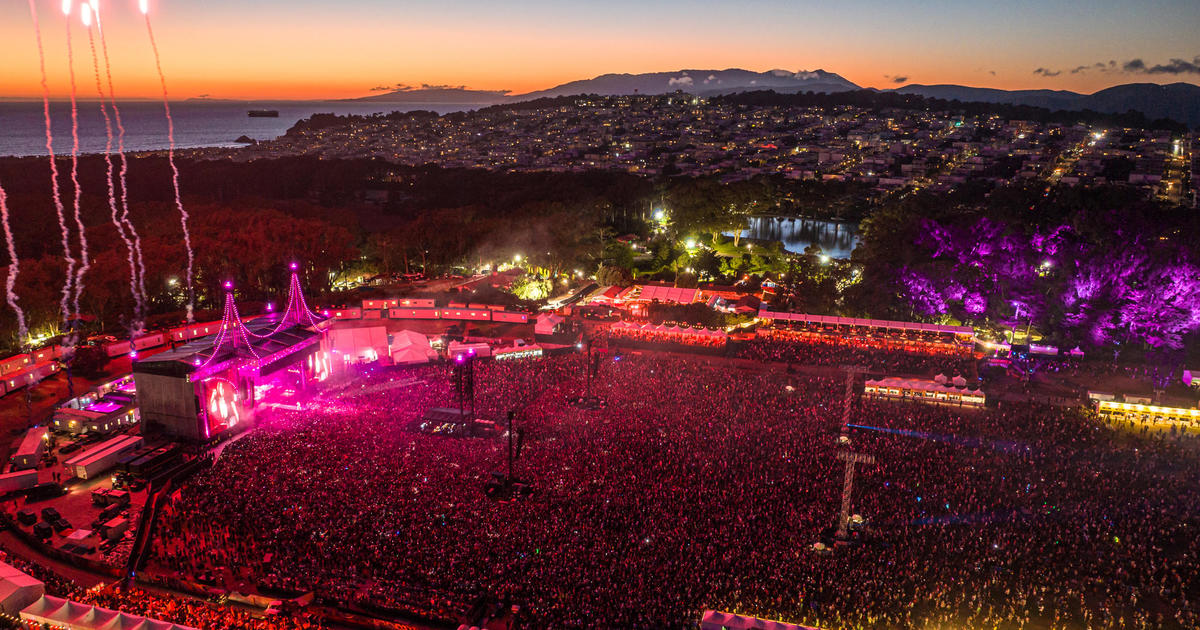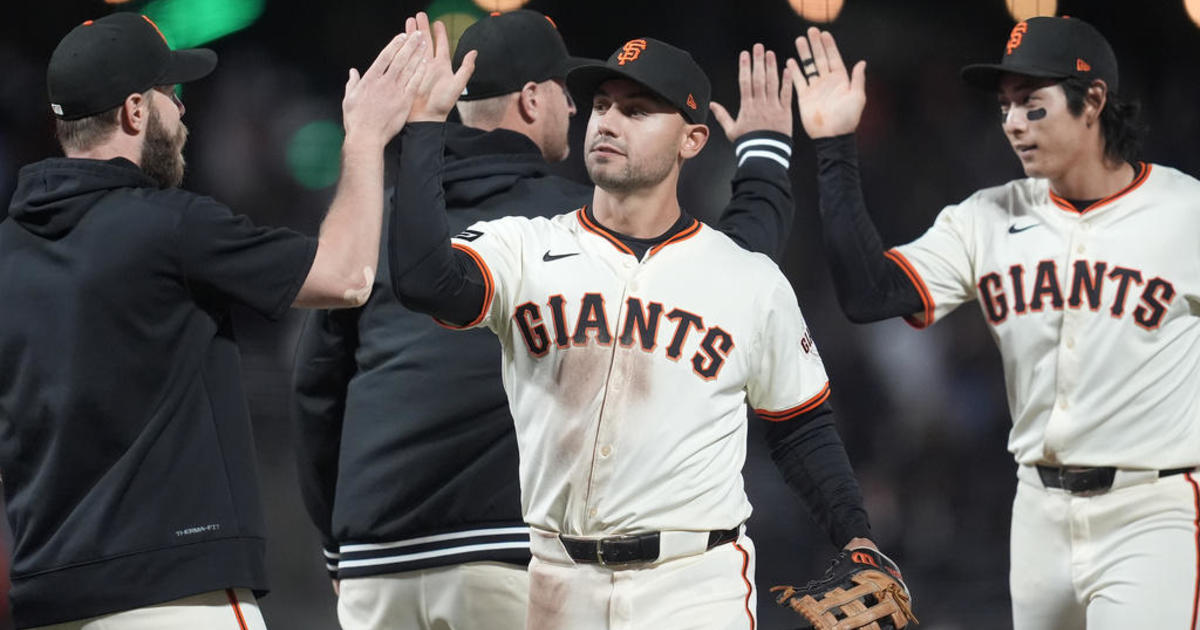CBS SF Talks To Shock Rock Pioneer Arthur Brown
By Dave Pehling
SAN FRANCISCO (CBS SF) -- While the average person might only know early British psychedelic rock band the Crazy World of Arthur Brown from their 1968 hit single "Fire," the group and its namesake lead singer have exerted a sizable influence on popular music since coming to fame almost a half century ago.
After spending some time in several London R&B groups following a stint studying theater in Paris during the mid-1960s, Brown teamed with keyboard player Vincent Crane, drummer Drachen Theaker and bassist Nick Greenwood. The Crazy World of Arthur Brown quickly established itself as a notable act with what would become the band's trademark of theatrical presentation replete with Brown's wailing operatic vocals, kabuki-style face paint and outlandish costumes, including his trademark flaming headpiece.
By the time the band issued it's eponymous debut album in 1968, it was being managed by the Who's managers Kit Lambert and Christopher Stamp and collaborating with guitarist Pete Townsend, who served as executive producer to the record. "Fire" became a huge hit and helped make the group's first record an enormous success on both sides of the Atlantic.
Despite the popularity of the single and tour dates with such '60s luminaries as Jimi Hendrix (who championed the band to black radio stations), the Doors and Frank Zappa, the group disintegrated when Crane and latter era drummer Carl Palmer split off to form Atomic Rooster. Palmer later came to far greater notoriety as part of '70s progressive-rock powerhouse Emerson, Lake and Palmer.
Brown would make his own prog-rock mark leading his next band Kingdom Come, but it was the style and theatrics of the original group that would exert a bigger influence. Besides inspiring the shock rock of Alice Cooper and the onstage theatrics of fellow UK prog band Genesis in the '70s, Brown's vocal histrionics, grease paint and fiery presentation would impact future disciples including metal singers (Iron Maiden's Bruce Dickinson and Mercyful Fate frontman and solo artist King Diamond), modern industrial rockers Marilyn Manson and Rammstein and a slew of corpse-painted European black metal bands.
While the singer stepped out of the spotlight for an extended period in the 1980s and later, he would eventually return to music, resurrecting the Crazy World moniker and becoming a regular festival attraction in Europe. It wasn't until he turned in a show-stopping performance at last year's Psycho Las Vegas festival as the opening night headliner that the festival's promoters realized the potential for a tour in the U.S.
Though he put his most recent Crazy World of Arthur Brown album Zim Zam Zim out back in 2013, this current jaunt through the States marks Brown's first full-blown tour here in nearly a half century. Brown recently spoke to CBS SF about his colorful history in rock music and his take on its current state ahead of his February 17th appearance at Slim's with support from touring partners Electric Citizen from Cincinnati and San Francisco stoner-rock favorites Acid King (who also appeared at the inaugural edition of Psycho Las Vegas).
CBS SF: I understand you're currently in Austin, Texas, with your band, rehearsing for the tour. I hear you lived there for a time in the '80s?
Arthur Brown: Yeah, I was there from 1980 to sometime in '96. I did various things there. I went there because I just had a family in England and English tastes in music were a little different for a while. So I thought it would be nice to go to America. I had offers for places in California and New York, but there were various people in the English entertainment world who said "If you've got a family you want to bring up, you should go to Austin."
So I did, but then the record deal that was supposed to accompany that fell through. So it was a choice of either going back to England and not knowing what or staying in Texas, which I liked. In Austin, there were lots and lots of musicians and lots and lots of clubs, but as a consequence, you didn't get each club to make much money.
Most people had a second occupation. A lot of it in those days was construction, so I became a carpenter for about a year and a half. Then I opened a house-painting company with Jimmy Carl Black of the Mothers of Invention.
CBS SF: You recorded with him as well?
Arthur Brown: Yeah, after two or three years of doing the house painting, we would play together. We had met at various festivals at the end of the '60s in America. So we got together and he had around a lot of the guys from the Mothers, so we put together a little band occasionally.
And we had another band which was a very strange band that had a guy named Dan Del Santo. He was responsible for bringing all the African musicians over here into Texas. He had an African band. So he was on bass, Jimmy was on drums and John Streheli, who used to be in Spirit, and another guy called Robert Atwood who was a jazz guitarist. That was a pretty wild one.
So I wanted to make some R&B records that sounded like early R&B rather than the stuff they were doing in the '80s, so we did. And we got some of the best musicians in Austin at the time. And we even had one track with Bruce Hughes, who is the current music director for the band, but he was very young back then. He played bass on one track.
CBS SF: I was excited to see you at Psycho Las Vegas, but was totally unprepared for how powerful your main stage set was going to be. Every single person I know who saw it was just blown away about your voice and how great the set was. Given the reception you got, why has it taken so almost 50 years to embark on another full U.S. tour?
Arthur Brown: Well, there are a few things really. When I first was in America, I was concentrating on my family and didn't want to go touring as such. Secondly, I began to explore acoustic music and different management. I also wanted to more experimental music, and that made it difficult to get onto the big shows, because it was a little too experimental at the time.
And in between, musical tastes had changed. Now of course, a lot of young people like music from all periods, so it isn't like it was at that time when for three to five years, a certain style of music was out of fashion. Now everything is in fashion. There's always an audience. So it was a combination of all that. And as a result, I didn't get asked to do a tour [laughs].
CBS SF: That festival featured a wide array of heavy music and psychedelic rock, some of it on the more extreme end of the spectrum than I would place your sound. How was your experience at Psycho Las Vegas and were there any bands that you saw that stood out during the weekend?
Arthur Brown: There were several bands that stood out, I'm just trying to remember their names. Really, when you get on those festivals, it's nice to see a little bit of several bands, but then you just want to relax. Because coming over with jet lag and all of that, meh.
I will say over the last ten years, we've done quite a lot of things in Germany and Scandinavia and have encountered a variety of black metal, death metal, heavy metal and industrial metal. They vary from sheer noise that has it's own rhythm just by being noise -- there wasn't any other rhythm in there -- all the way through to more of the heavy, hard rock.
I've come to appreciate it more than I used to. Because when it first came out, I didn't like it so much because it wasn't as easy to dance to. You could shake your head a bit, but I like dancing. But I have been very surprised. In Austin I produced a band that was more of a proto punk band called Green Machine.
I was surprised that their noise was very heavy, like a few people having a gang war in a kitchen or something. But when I looked at the lyrics, a lot of psychedelic type lyrics were in there. They were the heirs to that kind of writing, because most other people had stopped [writing like that].
I do remember being at one festival in Sweden, it was a big outdoor festival, and everybody -- I mean everybody -- was dressed in black leather and talking in American accents, even though they were German. "Heavy metal man!" [laughs]
CBS SF: You've spoken in some interviews I've seen about how you were as influenced by your theater studies in Paris in 1966 as you were by contemporary music when you first started the Crazy World of Arthur Brown. Was it the idea of giving the music a more theatrical presentation onstage rather than simply playing songs that shaped the band's approach, or was the aim to have an overarching story to the performance?
Arthur Brown: It was idea of having the story. I was fortunate to find two musicians who were able to think that way and play that way. I could tell them what type of feeling [I wanted], and then suggestions would come out. Between the three of us -- or two of use, depending on how we were working -- we would chose which chords and which rhythms came.
And our drummer was the first English person to have the complete Smithsonian collection of African drums. He did a lot of African drumming and he did a lot of electronic Stockhausen stuff. And for a short while, he was the percussionist with the Scottish Symphony Orchestra. So between the three of us, we could cover tuneful things, atonal stuff, whatever. Instead of having the normal ten-note octave scale, we could do whatever we wanted.
And because it was just a keyboard player -- whose left hand was amplified through a separate speaker -- and the drummer, we could go anywhere. The keyboard player didn't have to think, "Oh lord, how do I indicate to the bass player that I'm going to go into this outrageous territory that has nothing to do with what we're playing?" He could just do that.
We were able to improvise and go into different things. That led to experimenting while we were playing, which led to doing skits and comic stuff. In Paris, we were making up skits about the Pope cutting the President's hair, people getting high by smoking dandruff and whatever else we wanted to talk about. And because we were a musical act, some of the skits that were improvised on the spot were accompanied by music. It was only a question afterwards of figuring it out. The keyboard player was good remembering what we'd done, so we could build on that.
CBS SF: Was the absurdity and surrealism drawing on some of the contemporary British comedy of the time? I'm thinking about The Goon Show, the popular 1950's BBC Radio show that influenced the Beatles and Monty Python. Or were you looking back more to the Dadaist movement?
Arthur Brown: Yeah, both that and zen; you can be pretty outrageously non sequitur in zen. It works. After the Second World War, a lot of people in England had lost their confidence in what people said life was and what God was and whether there was a religion that could answer all their questions.
And rather than the French way, which was [French philosopher/playwright Jean-Paul] Sartre and a bit of pessimism, they voted for absurdity. So that's where a lot of the absurd influence came. It's the dark humor that the English like, which of course led to Monty Python and The Office and all that stuff.
But in my case, it was balanced out with the work of the romantic poets and Shakespeare. If you look at Shakespeare, you can see the double-dealing nature, the jealousy, the vicious, the murderous people as well as the beautiful. And there were the poets -- Keats, Shelley and Byron -- all of those who had a kind of mystical turn to things. So for me, it was balanced out between all of those influences.
CBS SF: When the Crazy World of Arthur Brown first broke out with the "Fire" single, it was a very transgressive song in a number of ways. Between the fire and theatrics and your vocal delivery and the dark subject matter and references to hell, the tune was a pretty major departure for British pop and rock. Though I suppose the Rolling Stones had made Their Satanic Majesties Request at that point. When you and the band came up with it, were you conscious of how subversive it was? Did you still hear it's commercial potential?
Arthur Brown: Well, "Fire" was the second single. "Devil's Grip" was the first a year earlier, which was before the Stones album. And we were popular enough to be taken over to the American underground scene by Bill Graham, which led into the great promotion that Lambert and Stamp were able to give us. They said they could either give me a comic character, since there was a lot of comedy in the band, or a dark one. And they decided they were much able better able to photographically and image-wise support a dark one.
When I was young, about 14 or maybe earlier, my parents both kind of had PTSD from the Second World War. My family was not exactly and easy family. One day I got home and my father came out and said, "I know you're not having an easy time in this family, so I've brought home this man who is going to teach you how to empty your mind." So I learned that [meditation] and practiced it.
By the time I got writing, I'd been involved in that direction and the satirical stuff and was more interested in an inner journey for an album rather than cars or drugs or girls or whatever the other hot things were at the time. I'd always liked sitting in front of the fire. It would put me in a trance. It was a coal fire in those days and we would sit back in the evenings with nothing much else to do but listen to the radio. It was before television. And I used to love looking into the fire, because it's a living thing and it moves with its different colors. It's quite amazing and it would send me into a trance.
So when I was thinking about the subject matter for the album about a journey inside, the fire became the portal through which you'd go on that journey. The first song on the album, "Prelude/Nightmare," was the world as it was then and as it seems to have become again today; pretty nightmarish with everything crumbling. So it was like if you want a journey away from that and away from the kind of thinking that brought that about, you had to go inwards. And the way to do it was through this portal of fire. That was how I saw the album.
CBS SF: You already mentioned the importance of Lambert and Stamp in breaking the group and the image you developed. Some of what I was reading indicated you wanted to do more of a full rock opera for the first Crazy World album, while Kit Lambert was pushing for a more commercial approach with cover songs. A year later, Lambert and Townshend would pursue the rock opera idea with Tommy a year later. Do you think you helped inspire their move in that direction?
Arthur Brown: Well, when Pete wrote Tommy, according to his autobiography, he wrote it with me in mind as the lead character, a kind of an operatic singer. And it was Lambert who steered him towards the band. He said, "No, no, we can do this as a band thing!" Pete at the time was not really sure if that was going to be possible. But of course it was and it went that way.
Pete has already written two short little theatrical things ["Rael" and "A Quick One While He's Away"]. He liked the idea of a piece that had some spoken word and some poetry and some narrative and some song, all together with big brass patterns that repeated. He supported that and appreciated it as an idea. In terms of the track "Spontaneous Apple Creation," I said, "Well, we've done these demos, but I haven't finished the melodies in that section." So he said, "Just do it anyway."
So I read the first verses and then sang the chorus and he said, "I think you should just leave it as it is; spoken." And I thought, "That's not a bad idea!" So he was helpful in that manner. Pete was looking at story ideas already. I don't know how it shifted to Tommy. Who knows where Pete got the idea. I think he liked the experimentation that we did on the Fire album and that certainly influenced it. But everybody is influenced by everybody else.
CBS SF: There was one influence of yours I wanted to bring up, especially after having seen you live. Your theatrics and vocal delivery definitely recall Screaming Jay Hawkins, and you covered "I Put a Spell On You" for the Fire album. But another artist who came to mind as I saw you perform was someone I was thinking you might have had an influence on was Tom Waits. However, when I listened to Zim Zam Zim, there were a couple of songs -- particularly "Jungle Fever" and "The Unknown" -- that echo the sound Waits found in the 1980s on Swordfishtrombones and Rain Dogs. Did some of the influence you may have had on him come around full circle on those songs from your latest album?
Arthur Brown: Yeah, my brother-in-law when I lived in Austin got me into Swordfishtrombones. I loved it. I thought it was absolutely brilliant, so of course there was an influence there. If you look at the Fire album, "I've Got Money" has got that voice in there. That's one thing I've had in my armory for a long time. Also, the two guys I wrote Zim Zam Zim with -- Sam Walker and Jim Baltimore -- they like Tom Waits. So I'm sure we put something in there.
CBS SF: The documentary series Metal Evolution featured you in an early episode that clearly illustrated what an impact you had on everyone from Alice Cooper to Bruce Dickinson from Iron Maiden to King Diamond from Mercyful Fate. Of the many acts who drew inspiration from you, are there any favorites who stand out?
Arthur Brown: Peter Gabriel was one. He always said he that he took a lot of influence theatrically from my performance and I just thought he was a really great artist. He came from a very different direction. He's got his own integral vision and I thought, "Well, that's wonderful!" Then I got talking to Bruce Dickinson, and he said he really loved Kingdom Come, my second band. We'd moved slightly more towards the pantomime area. And Alice Cooper, bless his heart, has always mentioned frequently that he was influenced by me. And I am singing three songs onstage with him in Rio this September.
If you look at the early things he did, which was obviously when he was first looking at my influence, he took the essence of it and went in his own direction. He took it stylistically away from what I had done modeled somewhat on witchdoctors and Japanese Noh and and Sufi stuff. His was more in the European tradition of the ringmaster and cruel fate [laughs]. I've looked at lots of people who I've had influence on, and the genuine ones have all taken it in their own direction and that's wonderful
The Crazy World of Arthur Brown plays Slim's on Friday, February 17, 9 p.m. $30



